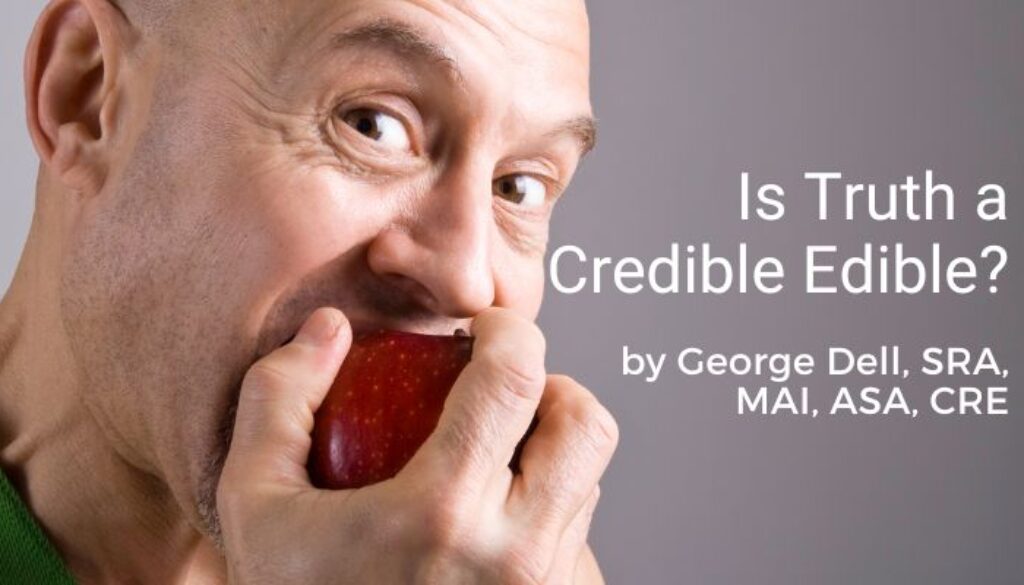Truth can be hard to swallow! I find their ‘truth’ not credible. Not believable. Why?
Well, for one thing. One important thing. That belief conflicts with MY belief. Clearly, my beliefs are better than theirs! Anybody can see that. At least they should see that. How can they be so stupid?
Brad Cable just sent me a link to an article by Dr. Margie Warrell on LinkedIn. Entitled “Beware blind spots. You don’t know what you’re wrong about.”
The basic theme is “What’s more important to you? The truth, or your prior beliefs?”
Appraisal professionals are harangued about the truth: “independent, impartial, objective” is the mantra. The truth is supposed to be unbiased. In ethics, and in analytics.
There is no doubt my beliefs are easier. Much easier. Beliefs are just there. No effort. Only defense. The truth might be something different. The truth takes work.
Best of all, if someone has a different stupid belief, it is easier to just attack the stupid person! And a lot more fun! And best of all, you will immediately have a group of co-believers validate you, your opinion, and your attack. You are so right, and they are so wrong.
I have long believed . . . that appraiser education should include some understanding of human behavior relative to forms of bias. It was obvious to me that we (and I) reflected what is called “anchoring” bias, where we tend toward the first number brought to our conscious mind.
Dr. Warrell suggested four personal action suggestions for those who really would like to seek the truth, rather than attack other-believers.
- Decide you value the truth over being right. This one is hard for me. I love feeling right, even when it may be wrong. Yet it is what my profession requires. My actual survival, more than once in my live depended on my being willing to seek truth, even when it hurt to be open to change.
- Prioritize curiosity over certainty. This one has been easier for me. I have always been a curious on how others did things, how things really are, and what might be. My curiosity led me back to school – after I had become an appraiser. It led me back to numerous graduate level courses in math, econometrics, statistics, computer cleverisms, and insurance (risk analysis). Anything which might relate to valuation in a world rapidly changing from personal (biased?) judgment to data-driven, computationally possible world. My curiosity prevented me from getting the coveted PhD – but enabled me to enjoy my life much more.
- Listen to learn. This one is really hard for me. I am extremely visual three dimensional. I tend to think more about what I want to say, rather than what I can learn. About what is said, or about the person doing the saying. Ironically, I have found that when I keep my mouth shut, people think I am smarter. Active listening helps prevent destructive verbaling.
- Be willing to change your mind. This one has grown on me. It takes effort, but has payoff. And it gets easier after the initial effort to challenge my automatic beliefs. Learning new things and changing has become fun for me. I no longer need to attack others for their stupid beliefs. Only I present what I know, and ask the right question. When people are not threatened, they are able to change. Aggression is threatening.
I seldom have to swallow my pride. It is just me. Unadorned. Unaggressive. But helpful.

August 24, 2022 @ 5:18 am
Another profoundly insightful column. The tension between truth and beliefs manifests everywhere in our society today . . and it is getting worse. Curiosity and willingness to change are important for life-long learning; our careers and the larger world we live in. And listening is a critically important part of the equation, something I always try to remind myself to do . . talking is easy, listening is hard. Facts and truth matter.
August 24, 2022 @ 6:32 am
One thing I’ve learned over the years is that the facts have to come first. Facts may not tell us the full story but it’s where we have to begin.